Unit 7 Teenagers should be allowed to choose their own clothes-Section A 1a-2d课件(共71张PPT,内嵌音频)
文档属性
| 名称 | Unit 7 Teenagers should be allowed to choose their own clothes-Section A 1a-2d课件(共71张PPT,内嵌音频) | 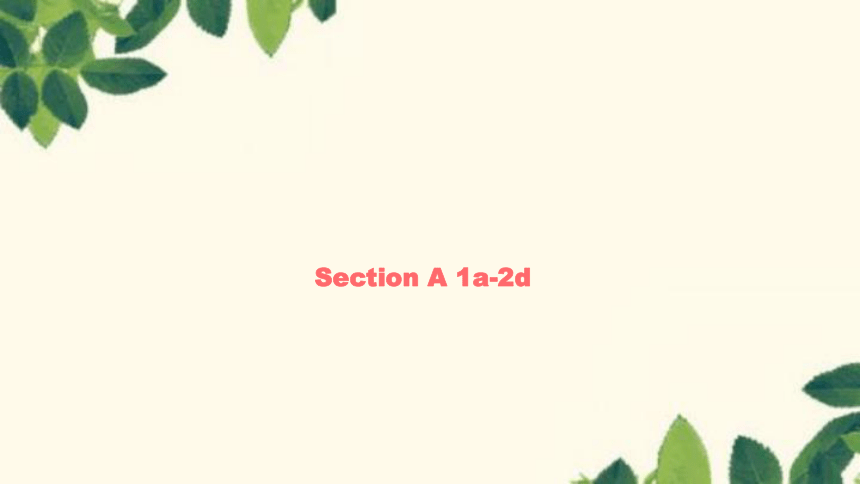 | |
| 格式 | pptx | ||
| 文件大小 | 6.8MB | ||
| 资源类型 | 教案 | ||
| 版本资源 | 人教新目标(Go for it)版 | ||
| 科目 | 英语 | ||
| 更新时间 | 2022-09-30 16:03:05 | ||
图片预览

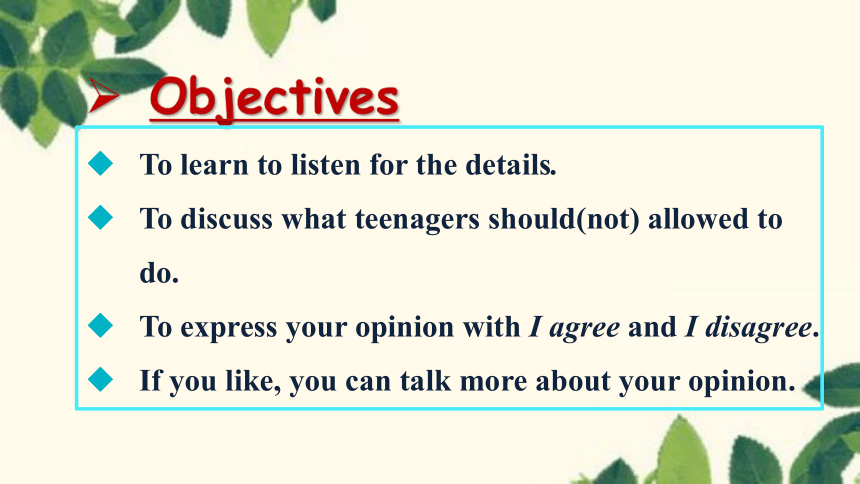
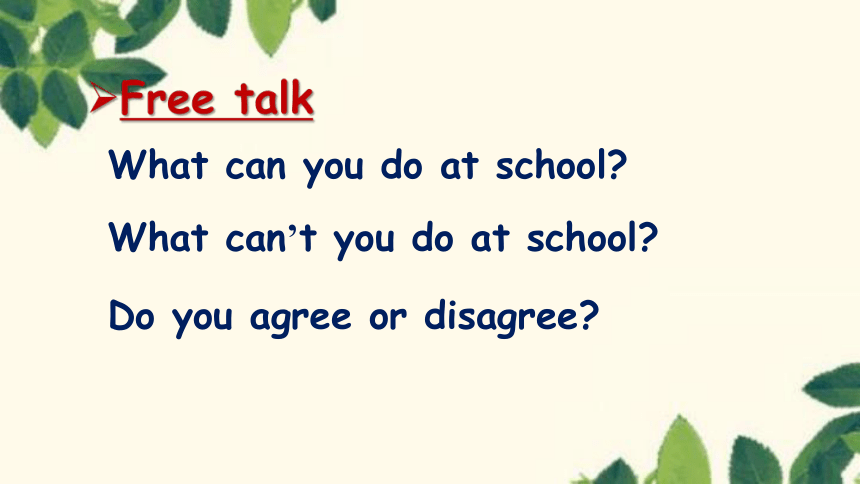
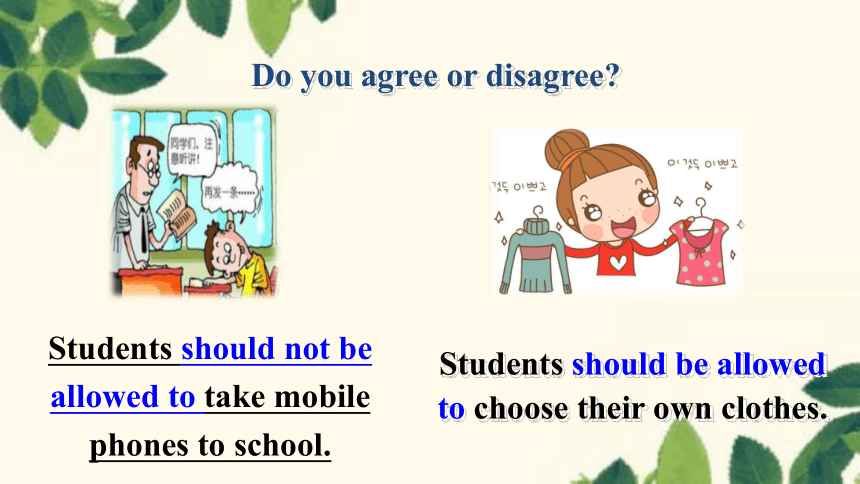
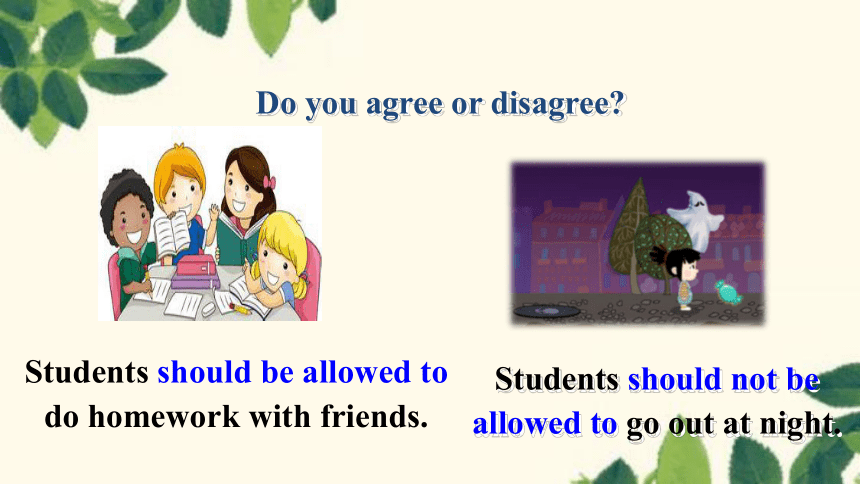
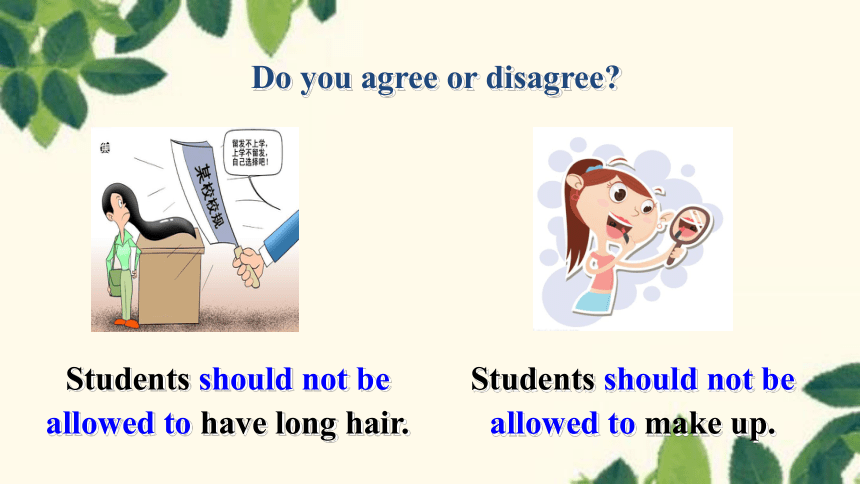
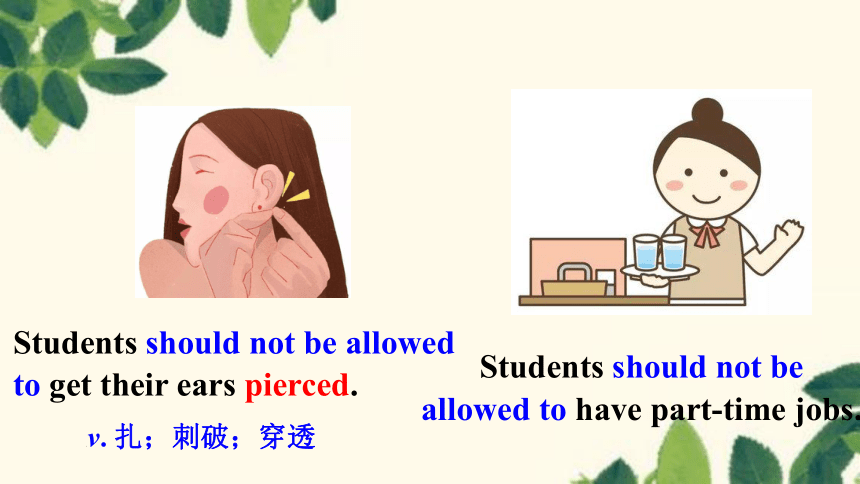
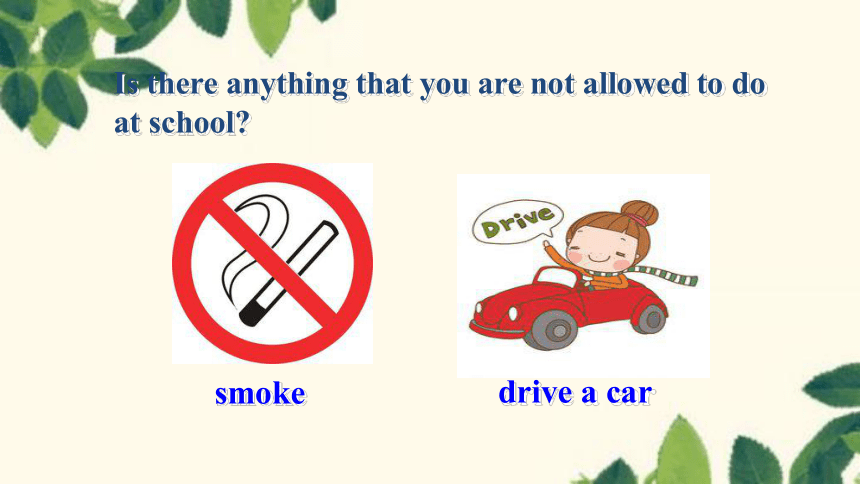
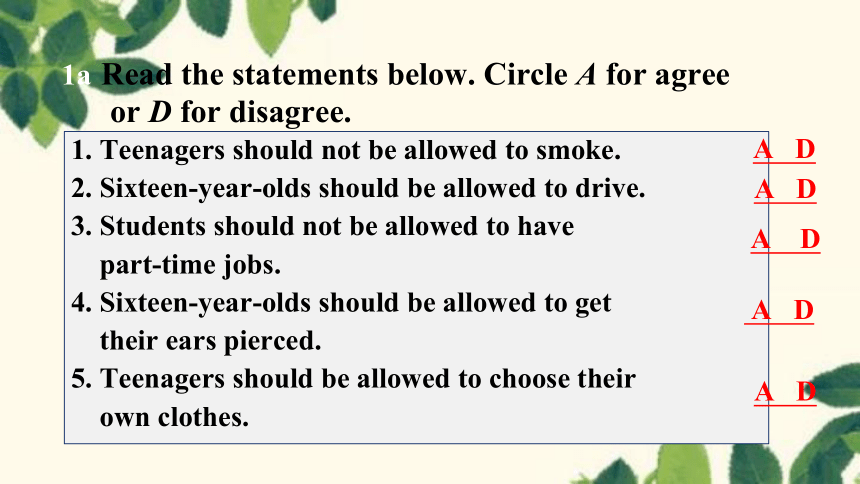
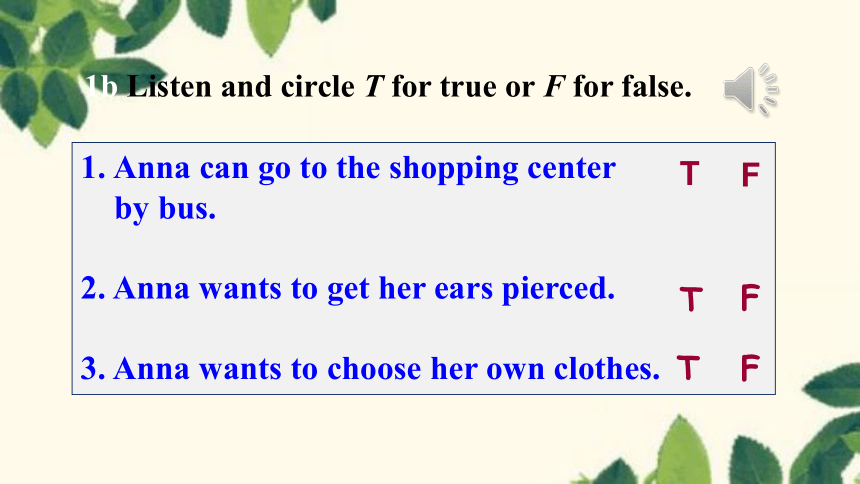
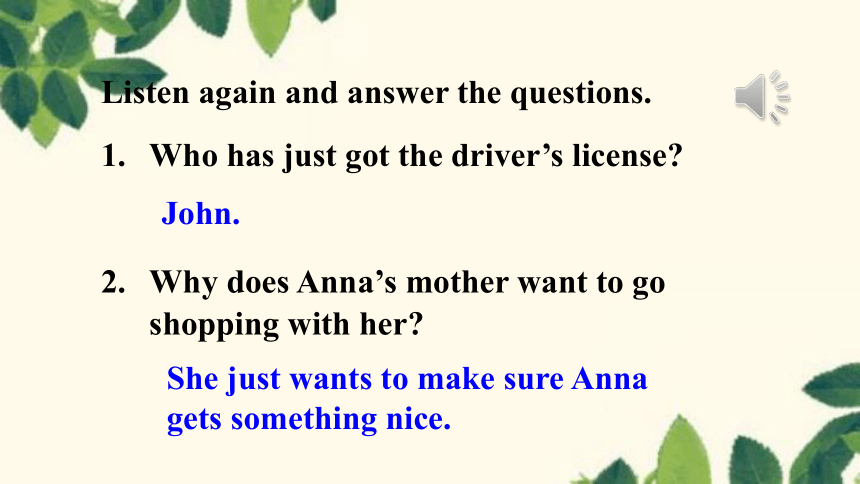
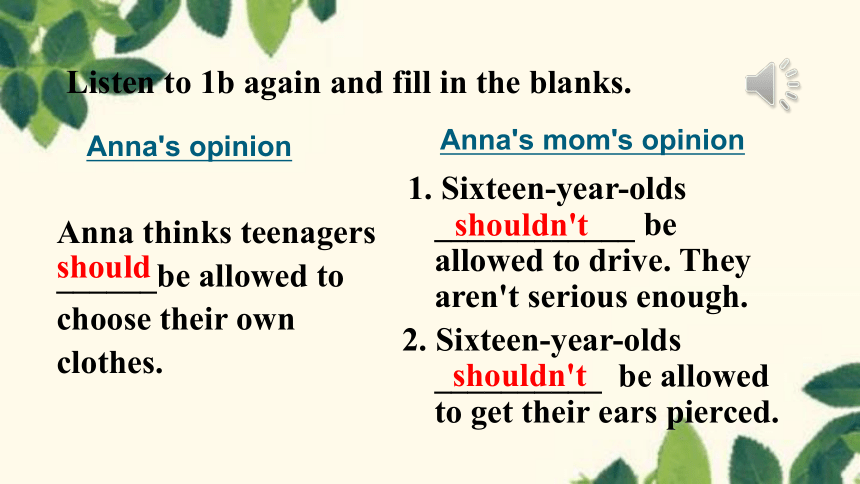
文档简介
(共71张PPT)
Section A 1a-2d
Objectives
To learn to listen for the details.
To discuss what teenagers should(not) allowed to do.
To express your opinion with I agree and I disagree.
If you like, you can talk more about your opinion.
What can you do at school
What can’t you do at school
Do you agree or disagree
Free talk
Students should not be allowed to take mobile phones to school.
Do you agree or disagree
Students should be allowed to choose their own clothes.
Students should be allowed to do homework with friends.
Do you agree or disagree
Students should not be allowed to go out at night.
Students should not be allowed to have long hair.
Do you agree or disagree
Students should not be
allowed to make up.
Students should not be allowed to get their ears pierced.
] v. 扎;刺破;穿透
Students should not be
allowed to have part-time jobs.
drive a car
smoke
Is there anything that you are not allowed to do at school
1a Read the statements below. Circle A for agree
or D for disagree.
1. Teenagers should not be allowed to smoke.
2. Sixteen-year-olds should be allowed to drive.
3. Students should not be allowed to have
part-time jobs.
4. Sixteen-year-olds should be allowed to get
their ears pierced.
5. Teenagers should be allowed to choose their
own clothes.
A D
A D
A D
A D
A D
1b Listen and circle T for true or F for false.
Anna can go to the shopping center
by bus.
2. Anna wants to get her ears pierced.
3. Anna wants to choose her own clothes.
T
F
T
F
T
F
Listen again and answer the questions.
Who has just got the driver’s license
Why does Anna’s mother want to go shopping with her
John.
She just wants to make sure Anna gets something nice.
Anna thinks teenagers
______be allowed to
choose their own
clothes.
1. Sixteen-year-olds ____________ be allowed to drive. They aren't serious enough.
2. Sixteen-year-olds __________ be allowed to get their ears pierced.
Anna's opinion
Anna's mom's opinion
should
shouldn't
shouldn't
Listen to 1b again and fill in the blanks.
A: I don’t think sixteen-year-olds should be
allowed to drive.
B: I agree. They aren’t serious enough.
too wild not serious enough
too young not old enough
too silly not calm enough
1c Look at the statements in 1a and make
conversations. Use the phrases in the box below.
A: I think teenagers should be allowed to go out with their friends.
B: I agree. They are old enough. They can look after themselves well.
A: I don’t think twelve-year-olds should be allowed to get their ears pierced / wear earring.
B: I agree. It’s too silly to wear earrings in the school.
earring
A: I think students should be allowed to do homework with their friends.
B: I disagree. They often talk instead of doing homework.
Parents should allow teenagers to go out with their friends.
Parents should allow six-year-olds to drive.
Parents should allow fifteen-year-olds to choose their own clothes.
Teenagers should be allowed to go out with their friends.
Sixteen-year-olds should be allowed to drive.
Fifteen-year-olds should be allowed to choose their own clothes.
Do you agree or disagree
2a What does Molly think of Kathy’s statements
Listen and circle A for Agree, D for Disagree
or DK for Don’t Know.
Kathy
Molly
Kathy Molly
1. Sixteen-year-olds should not be allowed to work at night. A D DK
2.Larry shouldn’t work every night. A D DK
3.He should cut his hair. A D DK
4.He should stop wearing that silly earring. A D DK
5.He doesn’t seem to have many friends. A D DK
It looks cool.
Young people need to sleep.
He needs to spend time with friends.
He needs time to do homework.
It doesn’t look clean.
4
1
3
2
5
2b Listen again. What are Kathy’s and Molly’s
reasons Number their reasons in the correct
order.
Molly is working late tonight.
Both Kathy and Molly think teenage boys never get tired.
Kathy and Molly don’t think Larry should work every night.
Larry’s hair is too long and doesn’t look clean.
Larry doesn’t have many friends because he doesn’t like to make friends.
True or false
F
F
T
T
F
2c Make a list of the things teenagers should and
should not be allowed to do. Discuss your list with
your partner.
B: Yes, I …
A: Do you think teenagers should …
A: Do you think teenagers should be allowed to surf the Internet
B: Yes, I … / No, I …
Pair work
A: Do you think teenagers should be
allowed to drink
B: Yes, I … / No, I …
A: Do you think teenagers should be
allowed to play computer games
B: Yes, I … / No, I …
Sandy: I'm really excited about seeing the famous
paintings by Picasso.
Wu Lan: Me, too! I’m glad Mr. Smith chose the art
museum for our school trip this year.
Sandy: I’m going to bring my new camera to take lots of
photos!
Wu Lan: Oh, no.Mr. Smith says we must
not take photos. It's not allowed
in the museum.
2d Role-play the conversation.
Sandy: That’s too bad! Do you think we may be
allowed to take photos if we don't use a flash
Wu Lan: Hmm…I think they just want to protect the
paintings.So if you don’t use a flash,then it
may be OK.
Sandy: Yeah. I think we should be allowed to do that.
I'll bring my camera anyway.
What are they talking about
Who wants to take photos in the museum
Why is it not allowed in the museum
They are talking about the school trip to the art museum.
Sandy.
They want to protect the paintings in the art museum.
Read and answer the questions.
Read and then role-play the conversation.
Free talk
Sandy: I’m really _______ about seeing the famous _________by Picasso.
WuLan: Me, too! I’m glad Mr. Smith chose the art museum for our school trip this year.
Sandy: I’m going to bring my new camera to take lots of photos!
WuLan: Oh, no. Mr. Smith says we must not take
________. It’s not ____________in the museum.
Sandy: That’s too bad! Do you think we might be
Excited
paintings
photos
allowed
allowed to take photos if we don’t use a_____
WuLan: Hmm ... I think they just want to _______the paintings. So if you don’t use a light, then it might be OK.
Sandy: Yeah. I think we should be allowed to do that. I’ll _______my____________anyway.
protect
bring
camera
flash
Do you like reading in a library
Can you make a list of rules about
what we should be / should not be
allowed to do there
Library Rules
1. Please make sure your hands are clean
before handling books.
2. Please do not draw on books.
3. Please do not use crayons in books.
4. Please do not glue paper in books.
5. Please do not tear books.
6. Please do not eat while you read books.
7. Please do not write in books.
8. Please do not make holes in books.
9. Please do not bend pages in books.
10. Please and take care of books from the first
page to the end.
11. Please do not leave books out for pets to damage.
12. Please do not leave books out where younger
sisters and brothers can damage them.
13. Please keep your book in your backpack when
not being read so it will be safe and you will have
it each time you come to library.
1. allow sb. to do sth. 允许某人做某事
allow doing sth. 允许做某事
(sb.) be allowed to do sth. (某人)被允许做某事
Language Points
2. No way!
no way 意思是“不;决不,没门”,表示对对方要求
的一种回绝。语气比no重。
Give up our tea break No way!
让我们放弃工间休息时间?没门儿!
No way will I go on working for that man.
我不再给那个人工作了。
3. I don’t think sixteen-year-olds should be allowed to drive.
我认为16岁的孩子们不应该被准许驾车。
英语中有少数表示“猜想、臆断”的实义动词,如think, believe, suppose, imagine等,后面跟含否定意义的宾语从句时,习惯上把从句的否定转移到主句,构成
“I don’t think /…”结构。这种语言现象称为否定转移。
1) 我相信他不会来。 I don’t believe he will come.
2) 我认为他是不对的。 I don’t think he is right.
3) 句型转换, 每空一词。
I think that he is coming tomorrow. (改为否定句)
I ______ think that he ______ coming tomorrow.
don’t
is
sixteen-year-olds 十六岁的孩子们
相当于名词短语 sixteen-year-old children,
“一个16岁孩子”的表达方式:
a child of sixteen
a child of sixteen years old
a sixteen-year-old child
4. safety n. 安全;安全性
It’s very important to teach the children about road safety.
把交通安全常识教给孩子们是非常重要的。
We’re keeping you here for your own safety.
我们让你待在这里是为了你自身的安全。
Don’t worry about him. He is in safety.
别担心他,他很安全。
5. get their ears pierced
这是“get+名词(或代词)+过去分词”的句型,意思是“使……被做,请人做……”,表示让别人做某事。此时get 是使役动词。
I can’t get the work done by anybody.
我找不到人来干这项工作。
When are you going to get your hair cut
你打算什么时候去剪头发?
“get+名词(或代词)+过去分词”的句型,还可以表示“遭遇某事”。
I got my car repaired.
我让人修理了我的汽车。
James got beaten last night.
詹姆斯昨晚被打了。
He got his wrist broken.
他折断了手腕。
Ⅰ. 单选题。
1. It is ______ to work out this problem. You
needn’t go to the teacher.
A. enough easy B. easily enough
C. easy enough D. very easily
2. The young man is ______ to carry the heavy box.
A. enough strong B. strong enough
C. too strong D. so strong
C
B
Exercises
3.— Can you lend me some money I happen
not to have any with me now.
— ________ . Why are you always borrowing
money from me
A. No way B. Of course
C. I’m sorry D. OK
A
4. We don’t allow _______ in the reading room.
A. smoke B. to smoke
C. smoking D. to smoking
5. — Why don’t you watch TV at home
— I’d love to, but my mother doesn’t allow me ____ that.
A. do B. did
C. to do D. doing
C
C
Ⅱ.短语匹配。
(I) (Ⅱ)
1. 被允许开车 A. get one’s ears pierced
2. 挑选自己的衣服 B. be allowed to drive
3. 穿耳孔 C. choose one’s own clothes
4. have part-time jobs D. 和朋友一起出去
5. go out with friends E. 戴可笑的耳环
6. wear silly earrings F. 做兼职工作
Ⅲ. 用所给词的适当形式填空。
I don’t think children should ___________
(allow) to swim in the river alone.
2. Mom doesn’t allow me to get my ears _______ (pierce) because I’m too young.
be allowed
pierced
3. He never stops _______ (talk). He’s really outgoing.
4. Teenagers should be allowed ___________ (choose ) their own friends.
5. Last night I studied for a test instead of
___________ (watch) TV.
talking
to choose
watching
Ⅳ. 完成句子。
1. 我需要时间考虑你的建议。
2. 上周通过考试让Marcus 感到很兴奋。
Last week Marcus was excited about passing the English exam / test.
I need time to think about / consider your advice.
Passengers are not allowed ________(eat) or drink when they take the underground.
to eat
中考链接
乘坐地铁时乘客不允许饮食。 be allowed to do sth.
We ______ pay to get into the concert,
because it’s free.
A. mustn’t B. can’t
C. don’t need to D. might not
因为是免费的,我们进音乐会不必支付费用。
C
一定不要
不必
不能
不可能
Listen to 1b,2a and 2b.
Read and practice the conversation in 2d.
Make a conversation about family rules and write it down.
Homework
To listen to 1c and 1d, then complete them.
To learn new words: pronounce, increase, speed, partner…
Objectives
Do you have difficulties in learning English
What things are difficult for you
Discussion
What’s your problem in learning English How do you solve them
I have difficulties in
learning English.
Can you help me
The difficulties he has in learning English.
New words: can’t pronounce some of the words
spell some English words
Speaking: be afraid to speak
Listening: can’t understand spoken English
Writing: can’t make complete sentences
Reading: read very slowly
Grammar: make mistakes
1a Learning English can be difficult. What things are
difficult for you Read the list. Check ( ) the
statements that are true for you.
____ I can’t pronounce some of the words.(v. 发音)
____ I can’t always understand spoken English.
____ I don’t know how to increase my reading speed.
____ I can’t spell some English words.
____ I often make mistakes in grammar.
(v. 增加;增长)
(n. 速度)
1b What other things are difficult for you
Make a list.
1. I don’t know enough words to write well.
2. ________________________________
3. ________________________________
4. ______________________________
5. ________________________________
can’t get the pronunciation right
be afraid people might laugh at me
forget a lot of new words
don’t get much writing practice
1c Paul finds it difficult to learn English. Listen and
complete the learning challenges he talks about.
1. He can’t get the__________________ right.
2. He___________ a lot of new words.
3. He can’t always_____________ when people talk to him.
4. He doesn’t get much___________ practice.
pronunciation
forgets
understand
writing
Challenges
1d Listen again. Complete the solutions.
1. ________________ can help.
He can always_____________________ in his notebook and study them at home.
He can_____________________________ to practice speaking.
He should find a _______ to practice writing.
Listening
write the new words
join an English language club
pen pal
Solutions
1e Role-play conversations using the information
in 1c and 1d.
① A: I don’t have a partner to practice English with.
B: Maybe you should join an English club.
② A: I always forget the new words.
B: You can write the new words in your notebook
and study them at home.
A: I can’t always understand when people talk to me.
B: Maybe you should join an English language club
to practice speaking.
A: I forget a lot of new words.
B: Maybe you should write the new words in your
notebook and study them at home.
Pair work
1.I often make mistakes in grammar.
mistake n. 错误;过失 make mistakes 犯错
Tom didn’t make a single spelling mistake in his composition.
汤姆在这篇作文里一个字也没拼错。
mistake vt. 弄错,误解
I mistook the number and went to the wrong room.
我记错号码, 走错了房间。
Language points
2. challenge n. 挑战
He wants a career that offers a challenge.
他想要一份有挑战性的事业。
vt. 向……挑战;对……提出异议
I challenged him to show his proof. 我要他拿出证据。
He challenged my view on that matter.
他就我对那件事的看法提出异议。
3. solution n. (问题、疑难等的) 解决;解答
It may take a long time to find a solution to the problem.
也许要花很长时间才能找到解决这个问题的办法。 The solution of the problem requires a lot of time.
解决这个问题需要很多时间。
4. Maybe you should join an English club.
join/join in/take part in
(1) join=be a member of 参加, 指加入某种组织,并成为其中的一员。
join the army / party 入伍/党 join the club 加入俱乐部
join in 后接活动名称
join sb. 加入到某个人群之中
Ⅰ. 用所给词的适当形式填空。
1. Sometimes, I can’t get the____________ (pronounce) right.
2. I don’t know how__________ (improve) my spoken English.
3. The more careful you are, the fewer_________ (mistake)
you’ll make.
4. You can find a pen pal to practice________ (write).
5. She can’t______ (spell) English words.
Exercises
pronunciation
to improve
mistakes
writing
spell
Ⅱ. 用方框中所给单词的适当形式填空。
We must learn to face the __________ in our life.
2. He has trouble in understanding _______ English.
3. Can you think of a good _______ to the problem
4. You can listen to the tapes to get much listening _______.
5. The more careful you are, the fewer _______ you’ll make.
solution, practice, mistake, spoken, challenges
challenges
spoken
solution
practice
mistakes
— Excuse me, can you teach me how to ______
this new word
— No problem. Look at my mouth and listen
carefully.
A. prove B. pronounce
C. prepare D. produce
B
中考链接
证明
准备
发音
生产
你能教给我这个新词怎么样……
— Miss Huang always advises us to practice
speaking English after class.
— She is right. Speaking is an important
language __________.
A. sign B. skill C. suggestion
符号
技能
建议
B
Review the new words and expressions you’ve learned today.
Preview the article How Can You Become a Successful Learner on page 6.
Homework
Section A 1a-2d
Objectives
To learn to listen for the details.
To discuss what teenagers should(not) allowed to do.
To express your opinion with I agree and I disagree.
If you like, you can talk more about your opinion.
What can you do at school
What can’t you do at school
Do you agree or disagree
Free talk
Students should not be allowed to take mobile phones to school.
Do you agree or disagree
Students should be allowed to choose their own clothes.
Students should be allowed to do homework with friends.
Do you agree or disagree
Students should not be allowed to go out at night.
Students should not be allowed to have long hair.
Do you agree or disagree
Students should not be
allowed to make up.
Students should not be allowed to get their ears pierced.
] v. 扎;刺破;穿透
Students should not be
allowed to have part-time jobs.
drive a car
smoke
Is there anything that you are not allowed to do at school
1a Read the statements below. Circle A for agree
or D for disagree.
1. Teenagers should not be allowed to smoke.
2. Sixteen-year-olds should be allowed to drive.
3. Students should not be allowed to have
part-time jobs.
4. Sixteen-year-olds should be allowed to get
their ears pierced.
5. Teenagers should be allowed to choose their
own clothes.
A D
A D
A D
A D
A D
1b Listen and circle T for true or F for false.
Anna can go to the shopping center
by bus.
2. Anna wants to get her ears pierced.
3. Anna wants to choose her own clothes.
T
F
T
F
T
F
Listen again and answer the questions.
Who has just got the driver’s license
Why does Anna’s mother want to go shopping with her
John.
She just wants to make sure Anna gets something nice.
Anna thinks teenagers
______be allowed to
choose their own
clothes.
1. Sixteen-year-olds ____________ be allowed to drive. They aren't serious enough.
2. Sixteen-year-olds __________ be allowed to get their ears pierced.
Anna's opinion
Anna's mom's opinion
should
shouldn't
shouldn't
Listen to 1b again and fill in the blanks.
A: I don’t think sixteen-year-olds should be
allowed to drive.
B: I agree. They aren’t serious enough.
too wild not serious enough
too young not old enough
too silly not calm enough
1c Look at the statements in 1a and make
conversations. Use the phrases in the box below.
A: I think teenagers should be allowed to go out with their friends.
B: I agree. They are old enough. They can look after themselves well.
A: I don’t think twelve-year-olds should be allowed to get their ears pierced / wear earring.
B: I agree. It’s too silly to wear earrings in the school.
earring
A: I think students should be allowed to do homework with their friends.
B: I disagree. They often talk instead of doing homework.
Parents should allow teenagers to go out with their friends.
Parents should allow six-year-olds to drive.
Parents should allow fifteen-year-olds to choose their own clothes.
Teenagers should be allowed to go out with their friends.
Sixteen-year-olds should be allowed to drive.
Fifteen-year-olds should be allowed to choose their own clothes.
Do you agree or disagree
2a What does Molly think of Kathy’s statements
Listen and circle A for Agree, D for Disagree
or DK for Don’t Know.
Kathy
Molly
Kathy Molly
1. Sixteen-year-olds should not be allowed to work at night. A D DK
2.Larry shouldn’t work every night. A D DK
3.He should cut his hair. A D DK
4.He should stop wearing that silly earring. A D DK
5.He doesn’t seem to have many friends. A D DK
It looks cool.
Young people need to sleep.
He needs to spend time with friends.
He needs time to do homework.
It doesn’t look clean.
4
1
3
2
5
2b Listen again. What are Kathy’s and Molly’s
reasons Number their reasons in the correct
order.
Molly is working late tonight.
Both Kathy and Molly think teenage boys never get tired.
Kathy and Molly don’t think Larry should work every night.
Larry’s hair is too long and doesn’t look clean.
Larry doesn’t have many friends because he doesn’t like to make friends.
True or false
F
F
T
T
F
2c Make a list of the things teenagers should and
should not be allowed to do. Discuss your list with
your partner.
B: Yes, I …
A: Do you think teenagers should …
A: Do you think teenagers should be allowed to surf the Internet
B: Yes, I … / No, I …
Pair work
A: Do you think teenagers should be
allowed to drink
B: Yes, I … / No, I …
A: Do you think teenagers should be
allowed to play computer games
B: Yes, I … / No, I …
Sandy: I'm really excited about seeing the famous
paintings by Picasso.
Wu Lan: Me, too! I’m glad Mr. Smith chose the art
museum for our school trip this year.
Sandy: I’m going to bring my new camera to take lots of
photos!
Wu Lan: Oh, no.Mr. Smith says we must
not take photos. It's not allowed
in the museum.
2d Role-play the conversation.
Sandy: That’s too bad! Do you think we may be
allowed to take photos if we don't use a flash
Wu Lan: Hmm…I think they just want to protect the
paintings.So if you don’t use a flash,then it
may be OK.
Sandy: Yeah. I think we should be allowed to do that.
I'll bring my camera anyway.
What are they talking about
Who wants to take photos in the museum
Why is it not allowed in the museum
They are talking about the school trip to the art museum.
Sandy.
They want to protect the paintings in the art museum.
Read and answer the questions.
Read and then role-play the conversation.
Free talk
Sandy: I’m really _______ about seeing the famous _________by Picasso.
WuLan: Me, too! I’m glad Mr. Smith chose the art museum for our school trip this year.
Sandy: I’m going to bring my new camera to take lots of photos!
WuLan: Oh, no. Mr. Smith says we must not take
________. It’s not ____________in the museum.
Sandy: That’s too bad! Do you think we might be
Excited
paintings
photos
allowed
allowed to take photos if we don’t use a_____
WuLan: Hmm ... I think they just want to _______the paintings. So if you don’t use a light, then it might be OK.
Sandy: Yeah. I think we should be allowed to do that. I’ll _______my____________anyway.
protect
bring
camera
flash
Do you like reading in a library
Can you make a list of rules about
what we should be / should not be
allowed to do there
Library Rules
1. Please make sure your hands are clean
before handling books.
2. Please do not draw on books.
3. Please do not use crayons in books.
4. Please do not glue paper in books.
5. Please do not tear books.
6. Please do not eat while you read books.
7. Please do not write in books.
8. Please do not make holes in books.
9. Please do not bend pages in books.
10. Please and take care of books from the first
page to the end.
11. Please do not leave books out for pets to damage.
12. Please do not leave books out where younger
sisters and brothers can damage them.
13. Please keep your book in your backpack when
not being read so it will be safe and you will have
it each time you come to library.
1. allow sb. to do sth. 允许某人做某事
allow doing sth. 允许做某事
(sb.) be allowed to do sth. (某人)被允许做某事
Language Points
2. No way!
no way 意思是“不;决不,没门”,表示对对方要求
的一种回绝。语气比no重。
Give up our tea break No way!
让我们放弃工间休息时间?没门儿!
No way will I go on working for that man.
我不再给那个人工作了。
3. I don’t think sixteen-year-olds should be allowed to drive.
我认为16岁的孩子们不应该被准许驾车。
英语中有少数表示“猜想、臆断”的实义动词,如think, believe, suppose, imagine等,后面跟含否定意义的宾语从句时,习惯上把从句的否定转移到主句,构成
“I don’t think /…”结构。这种语言现象称为否定转移。
1) 我相信他不会来。 I don’t believe he will come.
2) 我认为他是不对的。 I don’t think he is right.
3) 句型转换, 每空一词。
I think that he is coming tomorrow. (改为否定句)
I ______ think that he ______ coming tomorrow.
don’t
is
sixteen-year-olds 十六岁的孩子们
相当于名词短语 sixteen-year-old children,
“一个16岁孩子”的表达方式:
a child of sixteen
a child of sixteen years old
a sixteen-year-old child
4. safety n. 安全;安全性
It’s very important to teach the children about road safety.
把交通安全常识教给孩子们是非常重要的。
We’re keeping you here for your own safety.
我们让你待在这里是为了你自身的安全。
Don’t worry about him. He is in safety.
别担心他,他很安全。
5. get their ears pierced
这是“get+名词(或代词)+过去分词”的句型,意思是“使……被做,请人做……”,表示让别人做某事。此时get 是使役动词。
I can’t get the work done by anybody.
我找不到人来干这项工作。
When are you going to get your hair cut
你打算什么时候去剪头发?
“get+名词(或代词)+过去分词”的句型,还可以表示“遭遇某事”。
I got my car repaired.
我让人修理了我的汽车。
James got beaten last night.
詹姆斯昨晚被打了。
He got his wrist broken.
他折断了手腕。
Ⅰ. 单选题。
1. It is ______ to work out this problem. You
needn’t go to the teacher.
A. enough easy B. easily enough
C. easy enough D. very easily
2. The young man is ______ to carry the heavy box.
A. enough strong B. strong enough
C. too strong D. so strong
C
B
Exercises
3.— Can you lend me some money I happen
not to have any with me now.
— ________ . Why are you always borrowing
money from me
A. No way B. Of course
C. I’m sorry D. OK
A
4. We don’t allow _______ in the reading room.
A. smoke B. to smoke
C. smoking D. to smoking
5. — Why don’t you watch TV at home
— I’d love to, but my mother doesn’t allow me ____ that.
A. do B. did
C. to do D. doing
C
C
Ⅱ.短语匹配。
(I) (Ⅱ)
1. 被允许开车 A. get one’s ears pierced
2. 挑选自己的衣服 B. be allowed to drive
3. 穿耳孔 C. choose one’s own clothes
4. have part-time jobs D. 和朋友一起出去
5. go out with friends E. 戴可笑的耳环
6. wear silly earrings F. 做兼职工作
Ⅲ. 用所给词的适当形式填空。
I don’t think children should ___________
(allow) to swim in the river alone.
2. Mom doesn’t allow me to get my ears _______ (pierce) because I’m too young.
be allowed
pierced
3. He never stops _______ (talk). He’s really outgoing.
4. Teenagers should be allowed ___________ (choose ) their own friends.
5. Last night I studied for a test instead of
___________ (watch) TV.
talking
to choose
watching
Ⅳ. 完成句子。
1. 我需要时间考虑你的建议。
2. 上周通过考试让Marcus 感到很兴奋。
Last week Marcus was excited about passing the English exam / test.
I need time to think about / consider your advice.
Passengers are not allowed ________(eat) or drink when they take the underground.
to eat
中考链接
乘坐地铁时乘客不允许饮食。 be allowed to do sth.
We ______ pay to get into the concert,
because it’s free.
A. mustn’t B. can’t
C. don’t need to D. might not
因为是免费的,我们进音乐会不必支付费用。
C
一定不要
不必
不能
不可能
Listen to 1b,2a and 2b.
Read and practice the conversation in 2d.
Make a conversation about family rules and write it down.
Homework
To listen to 1c and 1d, then complete them.
To learn new words: pronounce, increase, speed, partner…
Objectives
Do you have difficulties in learning English
What things are difficult for you
Discussion
What’s your problem in learning English How do you solve them
I have difficulties in
learning English.
Can you help me
The difficulties he has in learning English.
New words: can’t pronounce some of the words
spell some English words
Speaking: be afraid to speak
Listening: can’t understand spoken English
Writing: can’t make complete sentences
Reading: read very slowly
Grammar: make mistakes
1a Learning English can be difficult. What things are
difficult for you Read the list. Check ( ) the
statements that are true for you.
____ I can’t pronounce some of the words.(v. 发音)
____ I can’t always understand spoken English.
____ I don’t know how to increase my reading speed.
____ I can’t spell some English words.
____ I often make mistakes in grammar.
(v. 增加;增长)
(n. 速度)
1b What other things are difficult for you
Make a list.
1. I don’t know enough words to write well.
2. ________________________________
3. ________________________________
4. ______________________________
5. ________________________________
can’t get the pronunciation right
be afraid people might laugh at me
forget a lot of new words
don’t get much writing practice
1c Paul finds it difficult to learn English. Listen and
complete the learning challenges he talks about.
1. He can’t get the__________________ right.
2. He___________ a lot of new words.
3. He can’t always_____________ when people talk to him.
4. He doesn’t get much___________ practice.
pronunciation
forgets
understand
writing
Challenges
1d Listen again. Complete the solutions.
1. ________________ can help.
He can always_____________________ in his notebook and study them at home.
He can_____________________________ to practice speaking.
He should find a _______ to practice writing.
Listening
write the new words
join an English language club
pen pal
Solutions
1e Role-play conversations using the information
in 1c and 1d.
① A: I don’t have a partner to practice English with.
B: Maybe you should join an English club.
② A: I always forget the new words.
B: You can write the new words in your notebook
and study them at home.
A: I can’t always understand when people talk to me.
B: Maybe you should join an English language club
to practice speaking.
A: I forget a lot of new words.
B: Maybe you should write the new words in your
notebook and study them at home.
Pair work
1.I often make mistakes in grammar.
mistake n. 错误;过失 make mistakes 犯错
Tom didn’t make a single spelling mistake in his composition.
汤姆在这篇作文里一个字也没拼错。
mistake vt. 弄错,误解
I mistook the number and went to the wrong room.
我记错号码, 走错了房间。
Language points
2. challenge n. 挑战
He wants a career that offers a challenge.
他想要一份有挑战性的事业。
vt. 向……挑战;对……提出异议
I challenged him to show his proof. 我要他拿出证据。
He challenged my view on that matter.
他就我对那件事的看法提出异议。
3. solution n. (问题、疑难等的) 解决;解答
It may take a long time to find a solution to the problem.
也许要花很长时间才能找到解决这个问题的办法。 The solution of the problem requires a lot of time.
解决这个问题需要很多时间。
4. Maybe you should join an English club.
join/join in/take part in
(1) join=be a member of 参加, 指加入某种组织,并成为其中的一员。
join the army / party 入伍/党 join the club 加入俱乐部
join in 后接活动名称
join sb. 加入到某个人群之中
Ⅰ. 用所给词的适当形式填空。
1. Sometimes, I can’t get the____________ (pronounce) right.
2. I don’t know how__________ (improve) my spoken English.
3. The more careful you are, the fewer_________ (mistake)
you’ll make.
4. You can find a pen pal to practice________ (write).
5. She can’t______ (spell) English words.
Exercises
pronunciation
to improve
mistakes
writing
spell
Ⅱ. 用方框中所给单词的适当形式填空。
We must learn to face the __________ in our life.
2. He has trouble in understanding _______ English.
3. Can you think of a good _______ to the problem
4. You can listen to the tapes to get much listening _______.
5. The more careful you are, the fewer _______ you’ll make.
solution, practice, mistake, spoken, challenges
challenges
spoken
solution
practice
mistakes
— Excuse me, can you teach me how to ______
this new word
— No problem. Look at my mouth and listen
carefully.
A. prove B. pronounce
C. prepare D. produce
B
中考链接
证明
准备
发音
生产
你能教给我这个新词怎么样……
— Miss Huang always advises us to practice
speaking English after class.
— She is right. Speaking is an important
language __________.
A. sign B. skill C. suggestion
符号
技能
建议
B
Review the new words and expressions you’ve learned today.
Preview the article How Can You Become a Successful Learner on page 6.
Homework
同课章节目录
- Unit 1 How can we become good learners.
- Section A
- Section B
- Unit 2 I think that mooncakes are delicious!
- Section A
- Section B
- Unit 3 Could you please tell me where the restroom
- Section A
- Section B
- Unit 4 I used to be afraid of the dark.
- Section A
- Section B
- Unit 5 What are the shirts made of?
- Section A
- Section B
- Review of Units 1-5
- Unit 6 When was it invented?
- Section A
- Section B
- Unit 7 Teenagers should be allowed to choose their
- Section A
- Section B
- Unit 8 It must belong to Carla.
- Section A
- Section B
- Unit 9 I like music that I can dance to.
- Section A
- Section B
- Unit 10 You're supposed to shake hands.
- Section A
- Section B
- Review of Units 6-10
- Unit 11 Sad movies make me cry.
- Section A
- Section B
- Unit 12 Life is full of the unexpected
- Section A
- Section B
- Unit 13 We're trying to save the earth!
- Section A
- Section B
- Unit 14 I remember meeting all of you in Grade 7.
- Section A
- Section B
- Review of Units 11-14
